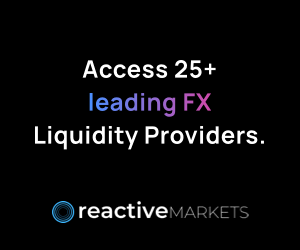The Last Look…
Posted by Colin Lambert. Last updated: May 23, 2022
While aimed at the broader community, last week’s announcement from Deutsche Bank that it was making vendor sustainability ratings compulsory for contracts over EUR 500,000 is likely to have an impact in its markets business relationships.
ESG, as so often seems the way in today’s world, can be a little polarising, with one camp seeing it as changing the world and another as a fad – but when a major house like Deutsche makes such a statement people have to pay attention. Service providers to the bank now have the real prospect of losing business if their ESG efforts are negligible – and with EUR 8 billion a year being spent on third-party services, it could be a significant hit.
The bank is working with ESG ratings provider EcoVadis (and other assessors) and says from the beginning of 2023, it will no longer suffice for suppliers to have undergone ESG assessment, they will have to have an adequately high sustainability rating – in the case of EcoVadis, this means achieving at least 25 of the 100 possible points.
This initiative is to be applauded in my view, because the finance industry does have to do its bit in helping sustain and improve sustainability and social efforts, but as always, there are (and I will focus on the FX industry here as usual) a number of complicating factors and questions to ask.
Perhaps the first issue in this instance is the (growing) number of ESG rating providers. All seem to have different ways of rating, which makes it very difficult to compare and contrast. It would be helpful to everyone I would suggest, if there was a uniformity of ratings, not least because, as an example, Refinitiv publishes ESG ratings but does not (rightly) include its owner LSEG in them – that is a judgement that needs to be made independently.
I had a quick look at the Refinitiv ratings, searching for FX trading services providers and came up with the following scores out of 100:
CME 52
Cboe 54
Deutsche Boerse 75
State Street 89
Euronext 55
Deutsche Bank itself scores 84 on these ratings, I also looked up non-bank trading firms as tech-heavy businesses and found Virtu Financial at 22 (the ratings are limited to listed companies).
Elsewhere, S&P provides reports and in its latest report on financial market infrastructure says ESG factors have “no material influence” on its credit ratings of Cboe Global Markets, Deutsche Boerse, and Euronext, and likewise on CME Group, although it does note that about 15% of the latter’s revenue comes from fossil fuel trading.
Coinbase, meanwhile, has “moderately negative” environmental factors thanks to Bitcoin trading, as well as social, the latter thanks to the speculative and volatile nature of cryptocurrencies. It also has governance issues thanks largely to the threat of cybercrime and operational outages. Conversely, thanks to its governance structure, LCH scores positively.
The assumption is that the third-party providers will be judged on the ESG rating of the parent company, although it would be interesting if, for example, an exchange was required to break down its ESG ratings across businesses.
The challenge for the FX industry (and perhaps Deutsche) could be that so many providers are private companies, but receive in excess of EUR 500,000 from the bank in brokerage, or connectivity. How do these firms provide an ESG rating, especially when getting one can cost six and seven figures to acquire? Is there actually any value in them doing so for a revenue stream of, perhaps EUR 600,000? Obviously, if more institutions follow Deutsche’s lead then yes, there is absolutely – in fact it could be business-threatening not to do so, but it would be a short-term hit at a time some don’t want such a challenge.
A tech-heavy trading firm, with a limited staff, that hasn’t signed up to the FX Global Code, is getting knocked down across the ESG board
Technology-heavy businesses will always be challenged in an ESG-world and as such conforming to these demands may prompt a sleepless night or two, but it is clear that solutions exist to alleviate (if necessary) ESG impacts, not least running the business in the right way. On which point, perhaps the most pertinent question has to be, will, at some stage, banks like Deutsche start looking at the ESG ratings of their own customers?
At a high level many do in refusing to finance, for example, fossil fuel projects, but in FX terms, will the banks start looking at how their customers’ markets business rate? A tech-heavy trading firm with a limited staff that hasn’t signed up to the FX Global Code for example, is getting knocked down across the ESG board.
Will buy side side firms be pushed towards the Code through a need to be more ESG-friendly? Or will they, as is the case with some of the firms I looked at in the Refinitiv data, pass muster because their environmental and social good outweighs the governance negative?
It will be interesting to see if this move prompts not only other banks to do the same (some already do of course) but whether it does percolate down to the markets businesses? Talking to both banks and buy side over the past year there does seem a sense that more market participants will be judged on their ESG efforts going forward, although those opinions were largely expressed in an environment where markets weren’t moving and providers’ prices were very similar. I wonder, being a cynic at heart, if moving markets will change that view and that, for example, a non-bank firm’s 25 rating will be ignored compared to a bank’s 85 rating because their liquidity stream is better?
Only time will tell on that, but last week’s announcement should be welcomed as providing momentum on an important issue, and leadership in an important sector. Overall, it provides a timely reminder to the fintech world above all else that in addition to a good idea, good technology and sufficient scale, they will now need to measure their ESG impact. Assuming, of course, we don’t suddenly see a rash of contracts with a pricing limit of EUR 499,999 per year!
@colinlambertFX




